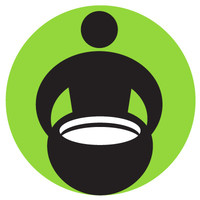This is the first article in a series on "The Future of Fair Trade," written in collaboration with Fair Trade USA. A 501 (c) (3) nonprofit organization, Fair Trade USA is the leading third-party certifier of Fair Trade products in the United States. To follow along with the rest of the series, click here.
When people think of Fair Trade, they might think of fair prices for farmers, better labor standards, or maybe even safe working conditions - but what people often forget about is that Fair Trade is equally invested in protecting the environment. Fair Trade not only helps improve farmers’ living and working conditions, but also helps them become better stewards of the land. Farmers who struggle to make ends meet are often forced to engage in cheap agricultural practices that compromise surrounding ecosystems.
We at Fair Trade USA believe that in order to improve producers’ living and working conditions, their environment must also be clean and healthy.
Strict environment standards
Rigorous environmental standards encourage farmers to better protect their delicate ecosystems and reduce the use of harmful chemicals. Here are a few examples of the environmental standards that farms must comply with in order to become Fair Trade Certified:
- Soil and Water: Enhance soil by applying sustainable irrigation practices such as crop rotation; source water sustainably and reduce water use over time
- Biodiversity and Carbon Emissions: Report current benefits and future goals for ecosystems and current methods of carbon emission reductions
- GMOs: Use of GMOs are strictly prohibited
- Agrochemicals: Handle agrochemicals safely and minimize their use
- Pests and Waste: Develop sustainable and safe management plans for pests and waste through farmer education
Fair Trade and Organic
Fair Trade and organic certifications are complementary and both show a profound commitment by farmers to environmental responsibility. While Fair Trade Certification does not require organic certification, it does support organic farming with training for producers and a higher price incentive for organic products.
In fact, many producers invest their Fair Trade premium funds in organic certification, which has led to outstanding results: over half (62 percent) of all Fair Trade imports into the United States are also organic, and 52 percent of all Fair Trade producer organizations world-wide hold organic certificates. Ultimately, reaching for these standards encourages the production of goods that benefit you, farming communities and the earth.
A benchmark for quality
By adhering to strict Fair Trade standards, farmers are not only able to make great strides in environmental sustainability, but also in the quality of their products. With the Fair Trade premium for community investment, farmers can spend more time and money on things like environmental education, training, quality testing and equipment efficiency. Through the development of sustainable growing and harvesting practices, quality crops are produced at minimal cost to our fragile ecosystem. Here are some inspiring environmental impact projects that were made possible through Fair Trade:
Environmental Education
CoopeTarrazú is a coffee farming cooperative located in the central mountains of San Marcos de Tarrazú, which is perhaps the most famous coffee-growing region in Costa Rica. In 2006, CoopeTarrazú established the Coffee Culture Quality of Life Sustainability Plan to track their environmental impact, implement better practices, and create a culture of environmental respect among members and children. Using the Fair Trade premium, CoopeTarrazú has developed a program that provides trainings, capacity building, and environmental leadership to its members. The key to their program is their focus on raising awareness of ecosystems through a strong educational curriculum for both adults and children.
“Before, my son never used gloves while he worked. But through the program he learned to protect himself while applying any agricultural inputs. For that I am so glad.” - William Naranjo Barrantes, Board Member of CoopeTarrazú Cooperative.Sustainable Agriculture Project
Associação dos Costas, Brazil
Associação dos Costas is an association of small-scale coffee farmers located in the state of Minas Gerais in southeastern Brazil. Thanks to Fair Trade, Associação dos Costas has developed an Environmental Impact Management project, which is an investigative assessment of the sustainable use, storage and control of agrochemicals on their Brazilian farms. The project resulted in the reduction of glyphosate use, incentives for the rational use of fertilizers and soil remediation, a complete overhaul of chemical storage, increased monitoring of crops, recycling campaigns for the return of empty containers of chemicals and the implementation of land conservation initiatives.
Within two years of implementing the project, the coffee farmers of the Cooperativa Dos Produtores de Café Especial de Boa Esperança Ltda are now using more sustainable inputs and techniques in almost all of their production.
“Today I am conscious of the environment. I am aware that in doing so, I am improving my quality of life and my family's quality of life. I feel proud to participate in the association. I am valued as a producer and am making new friends and acquiring new knowledge about sustainable agriculture.” - Antonio Fernandes, Associação dos Costas Member

Fair Trade USA is a nonprofit organization that is the leading third-party certifier of Fair Trade products in the United States. Fair Trade USA audits and certifies transactions between U.S. companies and their international suppliers to guarantee that the farmers and workers producing Fair Trade Certified goods were paid fair prices and wages, work in safe conditions, protect the environment, and receive community development funds to empower and uplift their communities.














